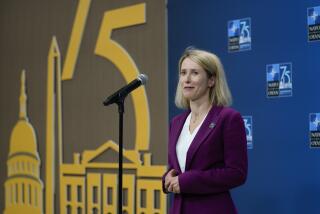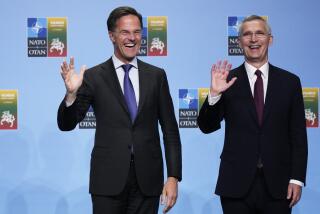World Perspective : EUROPE : A Younger Statesman for Bosnia : Baby-faced Carl Bildt is the latest EU envoy to seek peace in Balkans. Hopes, for now, are high for Swedish networker.
- Share via
BRUSSELS — It’s hard enough to talk about hope, let alone success, when the issue is finding a way to end the war in Bosnia-Herzegovina.
So when former Swedish Prime Minister Carl Bildt was named by the European Union earlier this month as the latest in a string of experienced statesmen to try their hand at brokering a Balkans peace settlement, news of the appointment was lost in the whirlwind of more dramatic events in the region.
Bosnia was sliding deeper into chaos; hundreds of U.N. peacekeepers had been taken hostage by rebel Serbs, and there was far more talk in Western capitals about abandoning the former Yugoslav federation to its fate than about searching for new peace formulas.
But as Bildt prepared his first report on the crisis for next week’s EU summit in the French resort town of Cannes, there was a break in the storm clouds over Bosnia sufficient to give rise once again to the subject of peace talks.
Whether the break is more than fleeting, whether the climate improves enough to make the prospects for a negotiated settlement worth probing further, and whether the baby-faced, 46-year-old Scandinavian can make any difference even if it does--these remain open questions.
Amid the uncertainty, however, one thing is undisputed: Bildt is a respected leader who brings new qualities to the peace efforts.
He will be working with the U.N. envoy, Thorvald Stoltenberg, and representatives from the five nations in the so-called Contact Group--the United States, Russia, Britain, France and Germany--that is also searching for a peace formula acceptable to all parties in the conflict.
Unlike his two predecessors--former British Foreign Secretaries Peter Carrington and David Owen--Bildt is no elder statesman. If parliamentary elections were called in Sweden next week, he would be the leading challenger for the premiership.
*
He is also an expert on military affairs, making his name in Sweden initially as one of the youngest and most influential members of a special commission established in the mid-1980s to investigate repeated incursions by Soviet submarines into the Stockholm archipelago.
These strengths, coupled with good links to the upper echelons of the Contact Group countries, are likely to help him shape opinion among influential outsiders working for a peace settlement.
An acknowledged expert on Russia and the Baltic states, Bildt is said to have developed a strong friendship with Russia’s foreign minister, Andrei V. Kozyrev, a key player in the Contact Group. He is also said to be close to German Chancellor Helmut Kohl and to know the ins and outs of the Pentagon and State Department.
“He’s a networker,” said a Swedish Foreign Ministry official who has followed Bildt’s career. “There’s nobody he doesn’t know.”
He also has proven mediation skills, having helped Moscow and the Latvian government resolve sticking points on the withdrawal of Russian troops that was completed last year. Against most expectations, he also held a four-party center-right coalition together between 1991 and 1994, making him the first conservative Swedish premier in this century to serve a full term in office.
“He’s extremely good at anticipating problems and resolving them quickly, not letting them drag out,” said Peter Wallensteen, a specialist in conflict research at Uppsala University north of Stockholm. “He’s starting [in Bosnia] at a time when an opening might be possible.”
Although Bildt is no expert on the Balkans, friends describe him as a voracious reader and an avid historian who not only devours political briefing papers but tries to view a problem in its larger context.
“This is a man whose preparation for Bosnia includes reading Ivo Andric,” said the Foreign Ministry official, referring to the Yugoslav writer who won the 1961 Nobel Prize for literature.
In his initial public statements on Bosnia, Bildt has been cautious. He said this week on his first trip to the region that he was doing more listening than talking yet indicated that a Contact Group peace plan presented last summer is not dead.
Speaking with reporters Wednesday in the Croatian capital, Zagreb, he said, “That has to be accepted as the starting point for negotiations.”
More to Read
Sign up for Essential California
The most important California stories and recommendations in your inbox every morning.
You may occasionally receive promotional content from the Los Angeles Times.













